11 Best AI SEO Tools to Dominate Rankings in 2025

Integrating AI into my search engine optimisation (SEO) strategy has not just been an upgrade; it has been a complete game-changer. The days of being buried under manual data analysis and exhaustive keyword research are over. The arrival of sophisticated AI SEO tools has fundamentally revolutionised how I approach everything from content creation and competitor analysis to technical on-page optimisation.
These platforms do not just accelerate familiar tasks. They consistently uncover insights, content gaps, and strategic opportunities that are almost impossible for a human to spot alone. By automating the labour-intensive parts of SEO, I can now focus my energy on high-impact strategic decisions that truly drive growth. For instance, instead of manually clustering thousands of keywords, I can use a tool to do it in minutes, immediately revealing the topical authority I need to build. A practical example is using a tool’s clustering feature on the seed keyword “sustainable fashion” to generate topic groups like “eco-friendly fabrics,” “ethical production methods,” and “second-hand luxury brands,” which instantly provides a structure for a content hub.
In this comprehensive guide, I will walk you through the top AI-powered SEO tools that have become indispensable to my workflow. For each platform, from industry giants like Semrush and Ahrefs to specialised content tools like SurferSEO and Frase, I will provide an in-depth profile. You will find a detailed breakdown of key features, honest pricing analysis, ideal use cases, and my personal take on their unique strengths and limitations. Each review includes screenshots and direct links to help you evaluate which solution best fits your specific business needs and budget. My goal is to equip you with the practical knowledge needed to choose the right AI SEO tools and effectively integrate them into your own digital marketing efforts.
1. Semrush: The All-in-One AI Marketing Powerhouse
Semrush is far more than just a standard SEO tool; it has evolved into a comprehensive digital marketing suite heavily integrated with sophisticated AI. I personally use it as my central command centre for monitoring keyword rankings, analysing competitor movements, and conducting in-depth technical site audits. Its AI features, like ContentShake AI and the SEO Writing Assistant, offer actionable, data-driven recommendations that move beyond generic advice.
For instance, when I am planning a new content cluster, I depend on its AI to not only suggest primary keywords but also to identify crucial semantic terms and user questions. This ensures my content is genuinely comprehensive. The platform stands out because it consolidates numerous functions, effectively replacing several specialised tools.
Key Takeaway: While the price is a significant consideration, the return on investment from its consolidated, AI-enhanced features makes it a powerful asset for any serious digital marketer.
Core AI Features and Use Cases
- ContentShake AI: Excellent for brainstorming content ideas and generating outlines based on top-ranking competitor content. A practical use case is inputting a competitor’s high-performing article on “home coffee brewing” and having the AI generate a unique outline that covers similar points but also identifies content gaps, like a section on “cold brew techniques”.
- SEO Writing Assistant: This real-time editor analyses your text against SEO best practices, providing on-the-fly suggestions for readability, tone of voice, and keyword integration.
- Market Explorer AI: I use this to gain invaluable, high-level insights into competitor strategies, which helps me quickly identify market gaps I can strategically exploit.
Pricing and Accessibility
Semrush operates on a subscription model with several tiers:
- Pro: Starting at around £108/month, aimed at freelancers and startups.
- Guru: Around £208/month, for SMEs and growing marketing agencies.
- Business: Approximately £416/month, designed for large agencies and enterprises.
While there is a free account with limited functionality, the true power of its AI SEO tools is unlocked in the paid plans. The sheer number of features can present a steep learning curve, but the user-friendly interface helps mitigate this. If you want to dive deeper into practical strategies, you can find further guidance on leveraging these kinds of tools in various SEO tips for digital marketing.
Website: https://www.semrush.com/
2. Ahrefs: The Data-Driven SEO Juggernaut
Ahrefs has long been my go-to tool for anything related to backlink analysis and deep keyword research. Its legendary database is second to none, but what has recently elevated its offering is the subtle yet powerful integration of AI to add context to its vast sea of data. I rely on it heavily for its AI-driven search intent classifications within the Keyword Explorer, which saves me hours of manual SERP analysis.
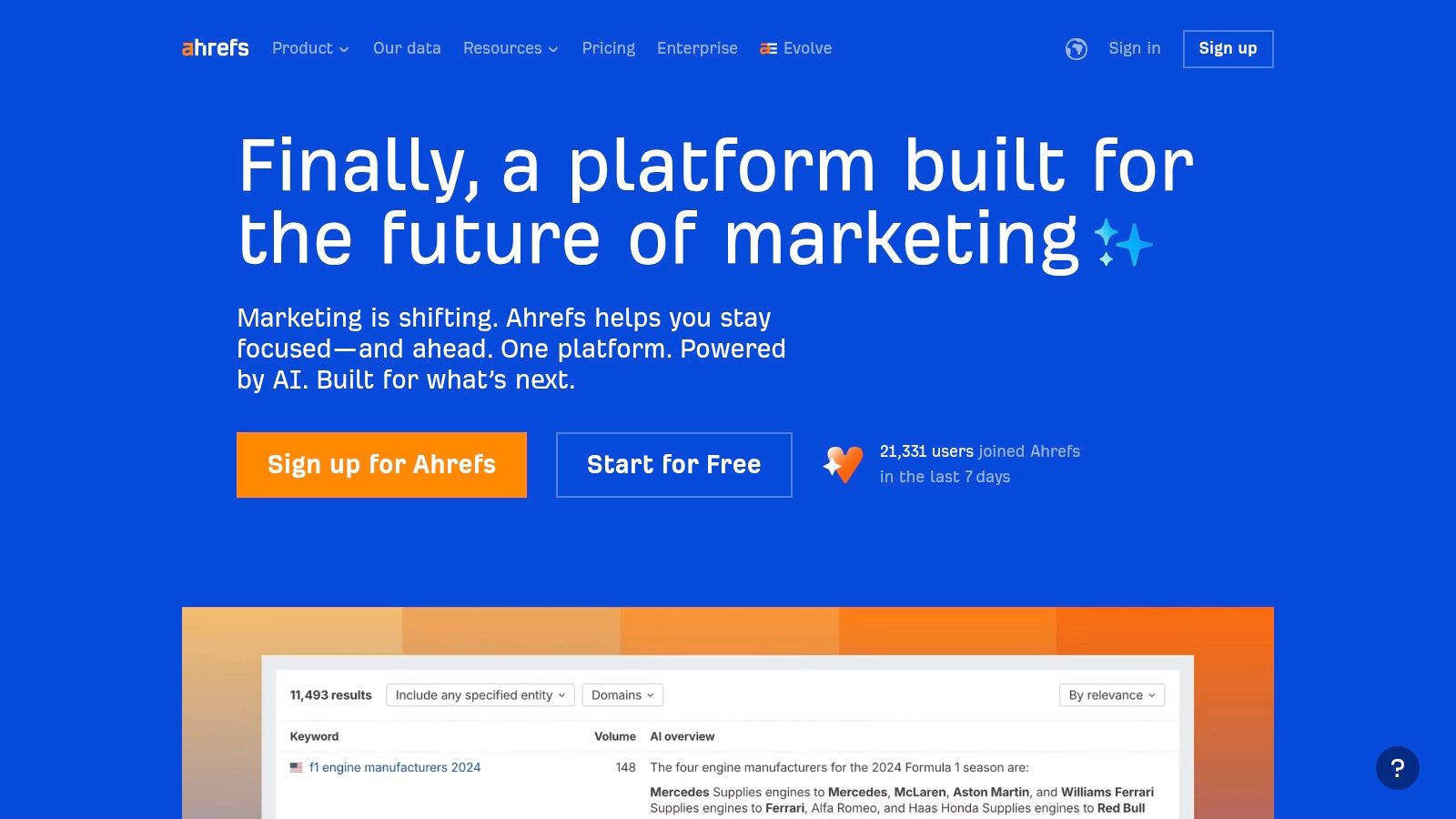
Unlike tools that focus on AI content generation, Ahrefs uses AI to refine and interpret its core data sets. When I am vetting a new keyword, Ahrefs’ AI helps me instantly understand whether the top results are informational, transactional, or navigational. This insight is critical for aligning my content with what searchers are actually looking for, making it one of the most practical ai seo tools for strategy development.
Key Takeaway: Ahrefs is the ultimate choice for data-centric SEOs who need the most comprehensive backlink and keyword data, enhanced with AI insights to guide strategic decisions.
Core AI Features and Use Cases
- Keyword Explorer with AI Intent: Automatically categorises keywords by search intent (e.g., informational, commercial), allowing for more precise content targeting. For example, it will flag “best running shoes” as “Commercial investigation” while flagging “how to tie running shoes” as “Informational,” allowing me to prioritise my content creation pipeline effectively.
- Content Explorer: I use this to uncover trending topics and content formats that are performing well, with AI helping to sift through the noise and identify genuine opportunities.
- SERP Analysis with AI Insights: The tool provides a clearer picture of SERP features and competitor positioning, which helps me strategise on how to rank for difficult keywords.
- Backlink Analysis: While not explicitly branded as an “AI feature,” the algorithms used to calculate metrics like Domain Rating (DR) and URL Rating (UR) are incredibly sophisticated, providing an accurate measure of a site’s authority.
Pricing and Accessibility
Ahrefs offers several pricing plans, though it notably does not have a free trial:
- Lite: Starting at around £79/month, ideal for small projects and hobbyists.
- Standard: Around £159/month, suitable for SEO professionals and in-house marketers.
- Advanced: Approximately £319/month, for growing teams and agencies.
- Enterprise: Custom pricing for large organisations with extensive needs.
While the price point can be a barrier for some, the quality and accuracy of its data are undeniable. Its user interface is famously clean and intuitive, making it easy to navigate its powerful features, even for those new to advanced SEO.
Website: https://ahrefs.com/
3. SurferSEO: The On-Page AI Content Optimisation Specialist
SurferSEO has carved out a distinct niche for itself by focusing intently on data-driven, on-page content optimisation. Where other tools aim to do everything, Surfer excels at one crucial thing: showing you exactly how to write and structure your content to outrank the competition. I regularly use its Content Editor to transform a good draft into a great one, ensuring it meets the statistical benchmarks set by the current top-ranking pages for my target keyword.
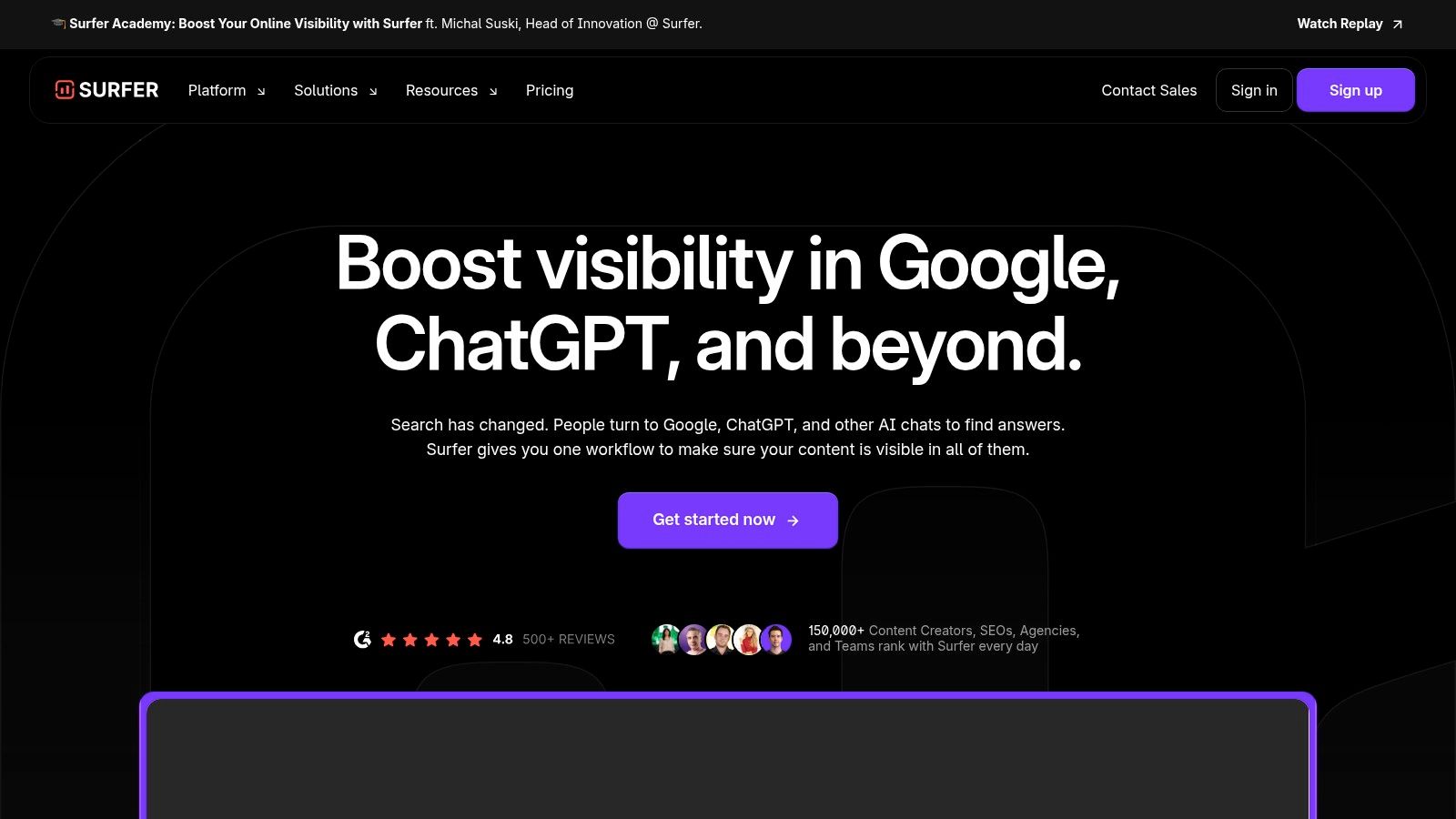
The platform’s AI analyses hundreds of on-page factors, from keyword density and word count to the number of headings and images. This provides a clear, actionable roadmap for content creation. Its Grow Flow feature is particularly useful, delivering weekly AI-generated tasks and insights that help me make consistent, incremental improvements across my site.
Key Takeaway: SurferSEO is an indispensable tool for anyone focused on creating top-tier, optimised content. It takes the guesswork out of on-page SEO, providing a clear, data-backed path to ranking higher.
Core AI Features and Use Cases
- Content Editor: This is Surfer’s flagship feature. It provides real-time feedback on your writing against top competitors, with suggestions for terms to include, heading structures, and ideal content length. A practical example is writing a blog post about “vegan protein sources” and having the editor suggest adding terms like “lentils,” “chickpeas,” and “complete protein” to increase the content’s topical relevance.
- SERP Analyzer: Before writing, I use this to deconstruct what is already working on page one. It breaks down the commonalities among top results, giving me a strategic blueprint.
- Grow Flow: A fantastic AI-driven task manager that suggests low-hanging fruit, such as adding internal links to existing pages or identifying new keyword opportunities, saving significant analysis time.
Pricing and Accessibility
SurferSEO is priced based on usage, primarily the number of content editors and audits you can run per month.
- Essential: Starts around £65/month, suitable for individuals or small projects.
- Advanced: Approximately £140/month, aimed at teams and regular content publishers.
- Max: Around £273/month, for agencies and large-scale content operations.
There is no free plan, but they offer a money-back guarantee. The user interface is exceptionally intuitive, making it one of the more accessible AI SEO tools for both beginners and seasoned professionals. A key consideration is that generating full AI articles with its integration costs extra credits, which are separate from the main plan’s allowances.
Website: https://surferseo.com/
4. Frase: The Ultimate AI Content Creation and Optimisation Tool
Frase excels by tightly integrating AI-powered research and writing into a single, cohesive workflow. I find it indispensable for its ability to go from a target keyword to a fully optimised, first-draft article in a fraction of the usual time. The platform’s core strength lies in its AI-driven content briefs, which analyse the top-ranking SERP results to give you a detailed blueprint for success.
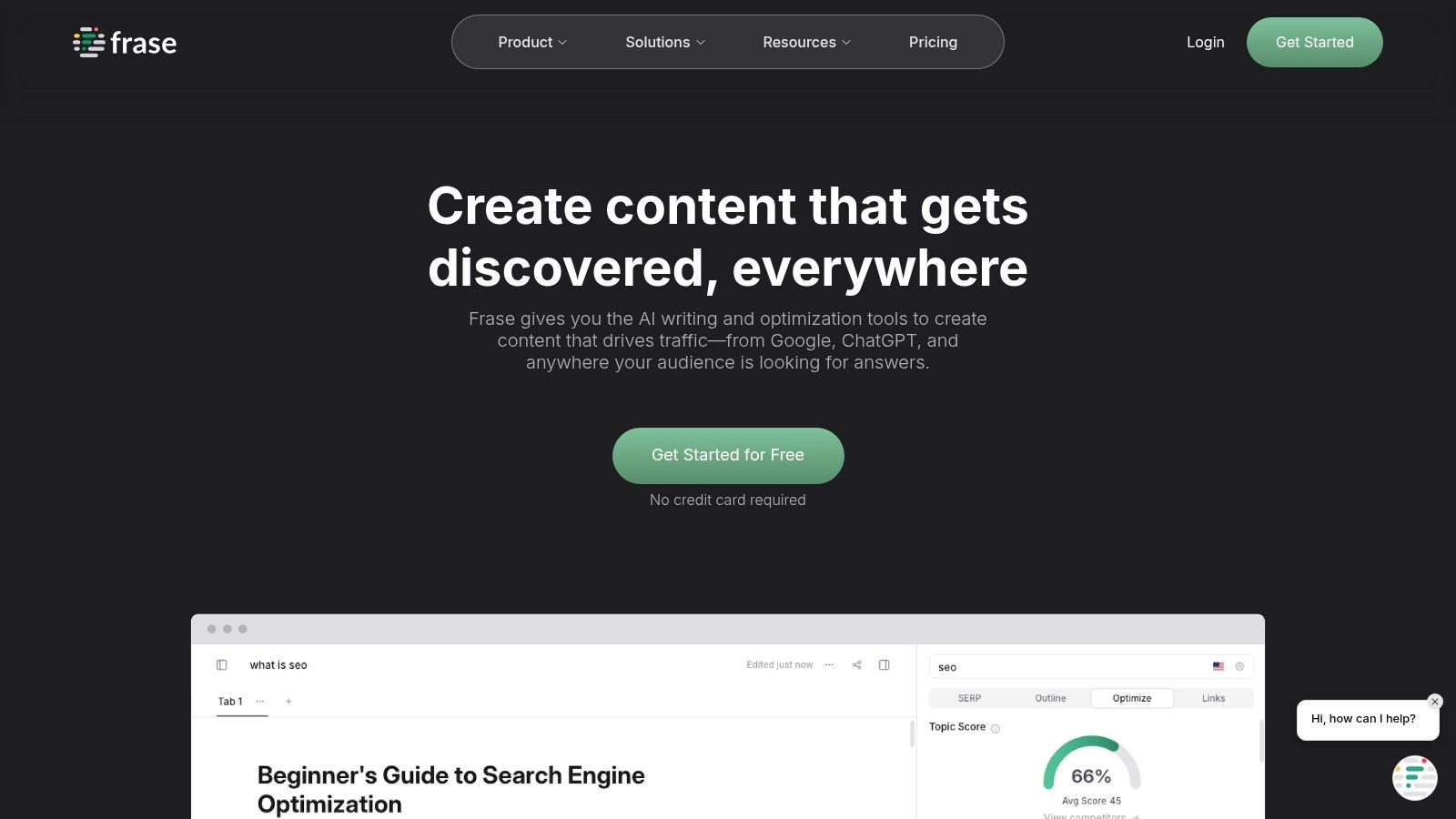
Unlike more generalist tools, Frase is laser-focused on the content creation process. For instance, when I am targeting a competitive term, I use its SERP analysis to instantly pull in headings, questions, and key topics from leading articles. This data-first approach ensures my content is not just well-written but also contextually relevant and primed to rank.
Key Takeaway: Frase is a remarkably efficient tool for any content creator or SEO professional who wants to streamline the research-to-draft process with actionable, AI-driven insights.
Core AI Features and Use Cases
- AI Content Briefs: Automatically generates comprehensive outlines by analysing top competitor content, providing headings, word count targets, and key topics.
- Content Optimiser: This real-time editor scores your content against top-ranking pages, giving you specific term recommendations to improve your topical authority. For example, it might highlight that your article on “project management software” is missing mentions of “Gantt charts” or “Kanban boards,” which are prevalent in top results.
- AI Writer: I use this to quickly generate paragraphs, intros, or even answer questions from the research panel, significantly speeding up the drafting phase.
- Answer Engine Optimisation: The tool is fantastic for identifying and structuring content to capture featured snippets and People Also Ask sections.
Pricing and Accessibility
Frase offers a straightforward pricing structure, making its AI SEO tools accessible to a wide audience.
- Solo: Starting at around £12/month, perfect for individuals or small projects.
- Basic: Approximately £36/month, catering to those scaling their content production.
- Team: Around £92/month, designed for agencies and collaborative content teams.
A “Pro Add-On” is available for unlimited AI writer access. While the core features are intuitive, mastering the synergy between the research panel and the AI writer can take a little practice. The user interface is clean and user-friendly, which helps to flatten the learning curve.
Website: https://www.frase.io/
5. WriterZen: The Focused Content Creation Toolkit
WriterZen distinguishes itself as a streamlined and highly focused toolkit, designed specifically to master the content creation lifecycle from keyword discovery to final optimisation. Where other tools offer a sprawling array of features, I find WriterZen excels by concentrating on what is most crucial for content strategists. Its AI-powered topic and keyword clustering are particularly effective, saving hours of manual sorting.
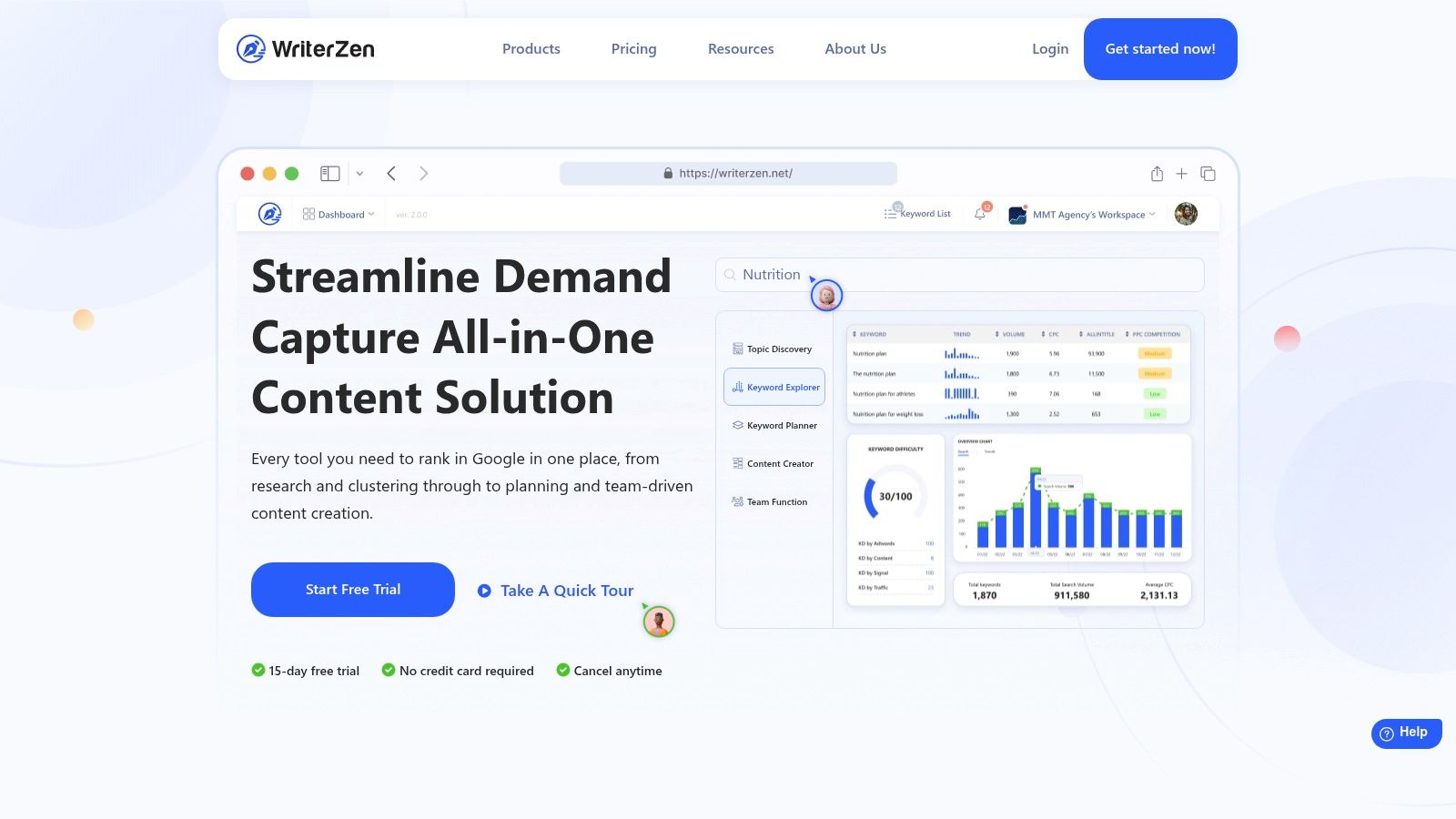
When I undertake development of a new content pillar, I use its Topic Discovery feature to map out an entire cluster of related articles, ensuring comprehensive topical authority from the outset. For example, for a pillar on “digital photography,” it will suggest clusters around “camera settings,” “photo editing software,” and “lighting techniques.” This precision, combined with its intuitive user interface, makes it an excellent choice for those who want powerful features without the overwhelming complexity of an all-in-one suite.
Key Takeaway: WriterZen is an affordable and powerful ally for content-centric SEO, offering exceptional keyword clustering and content brief generation that rivals more expensive platforms.
Core AI Features and Use Cases
- Keyword Explorer & Clustering: I use this to transform a broad seed keyword into neatly organised, semantically related keyword groups. This is invaluable for planning a logical site structure and content calendar.
- Topic Discovery: This AI feature helps generate a list of relevant headlines and subtopics based on top-ranking competitor content, forming the perfect foundation for a comprehensive article brief.
- Content Creator: A real-time content editor that provides AI-driven suggestions based on competitor analysis, helping to ensure your article is optimised for target keywords and covers all necessary entities.
Pricing and Accessibility
WriterZen offers a straightforward, credit-based subscription model that is highly accessible for individuals and small teams:
- Basic: Starting from around £32/month, aimed at individuals and light users.
- Standard: Approximately £57/month, for content professionals and small businesses.
- Advanced: Around £101/month, designed for agencies and high-volume content teams.
The platform’s user-friendly interface lowers the barrier to entry, although mastering the workflow between the different tools can take some practice. Its affordability and sharp focus on the content creation process make it one of the most practical ai seo tools for writers and content marketers. For those interested in improving their writing efficiency, resources like the Productivityist blog offer complementary tips on workflow management.
Website: https://writerzen.net/
6. MarketMuse: The AI Content Strategy and Optimisation Platform
MarketMuse is an AI-powered platform laser-focused on content strategy, planning, and optimisation. I turn to it when my goal is not just to rank for a keyword, but to establish genuine topical authority. Its AI delves deep into your subject matter, creating data-driven content briefs that guide writers to produce truly comprehensive and expert-level articles.
What makes MarketMuse unique is its emphasis on topic modelling and content inventory analysis. It does not just suggest keywords; it maps out entire content ecosystems, showing you precisely which topics to cover to be seen as an authority. For example, it might analyse my existing blog and identify that while I have covered “SEO basics,” I have a critical content gap around “local SEO for small businesses,” recommending specific articles to fill that gap. This strategic, long-term approach to content creation is where I find it delivers exceptional value.
Key Takeaway: For businesses committed to becoming the definitive resource in their niche, MarketMuse’s AI-driven strategic insights are invaluable, though the investment reflects its specialisation.
Core AI Features and Use Cases
- Content Briefs: The AI generates incredibly detailed briefs, including target word count, subheadings, internal/external link suggestions, and questions to answer, which is a massive time-saver for my content team.
- Topic Modeling & Gap Analysis: I use this to analyse my entire website, identifying crucial content gaps and opportunities to build out topic clusters that search engines favour.
- Content Optimisation Editor: Similar to other tools, it provides a real-time score as you write, but its suggestions are based on its sophisticated topic model, leading to more nuanced improvements.
Pricing and Accessibility
MarketMuse offers several plans tailored to different needs:
- Free: A limited plan allowing a few queries per month, great for getting a feel for the platform.
- Standard: Starts at $149/month (approx. £117/month), aimed at individuals and small teams.
- Team: Begins at $399/month (approx. £315/month), offering more queries and user seats for growing businesses.
- Premium: Custom pricing for large enterprises requiring extensive usage and API access.
While the price point is a consideration, especially for smaller operations, its power as one of the most advanced AI SEO tools for content strategy is undeniable. There can be a learning curve, but mastering it pays dividends in content quality and authority.
Website: https://www.marketmuse.com/
7. Alli AI: The On-Page Automation Specialist
Alli AI takes a unique approach to on-page optimisation by automating the implementation of SEO changes at scale. I find it particularly powerful for managing large websites where manually updating hundreds of pages with title tags, meta descriptions, or schema markup would be a monumental task. The platform essentially acts as an execution layer, allowing you to deploy critical on-page adjustments in bulk across your entire site without needing developer intervention.
Its real-time deployment capability is a standout feature. Instead of making changes in a CMS and waiting for them to go live, Alli AI applies them directly, making it incredibly efficient. A practical example is using its bulk feature to apply a new title tag formula like “[Product Name] – [Category] | [Brand Name]” across an entire e-commerce category of 500 products in a single operation. This is a game-changer for agencies or in-house teams managing extensive content libraries and needing to maintain SEO best practices consistently.
Key Takeaway: Alli AI excels at large-scale, code-free on-page optimisation, making it an indispensable tool for technical SEOs and agencies managing multiple enterprise-level websites.
Core AI Features and Use Cases
- Bulk On-Page Optimisation: I use this to apply templated title tags, meta descriptions, and other on-page elements across thousands of pages simultaneously, saving countless hours.
- Live Visual Editor: This feature allows for direct, real-time content edits on the front end of the website, which is perfect for making quick copy adjustments without logging into a complex backend.
- Automated Schema Markup: It simplifies the complex process of implementing schema, automatically generating and deploying the correct markup to enhance search engine visibility.
Pricing and Accessibility
Alli AI’s pricing is geared towards agencies and larger businesses, reflecting its focus on scale:
- Single-Site Plans: Start from around £209/month.
- Agency & Multi-Site Plans: Custom pricing is available upon request, designed for those managing multiple client websites.
While there is a limited trial period to test the platform, the cost can be a barrier for freelancers or small businesses. However, for large-scale operations, its ability to automate what would otherwise be resource-intensive manual work makes it one of the most efficient AI SEO tools available for on-page execution. You can find more strategies on how to apply such technical changes effectively in this guide to technical SEO.
Website: https://www.alliai.com/
8. Writesonic: The Versatile AI Content Creator
Writesonic is a powerful AI-driven content creation platform that excels at generating high-quality, SEO-optimised content quickly. I often turn to it when I need to produce articles, blog posts, or even social media copy at scale without sacrificing relevance. Its standout feature is the AI Writer, which can create entire articles from a simple prompt, complete with headings and a logical flow.
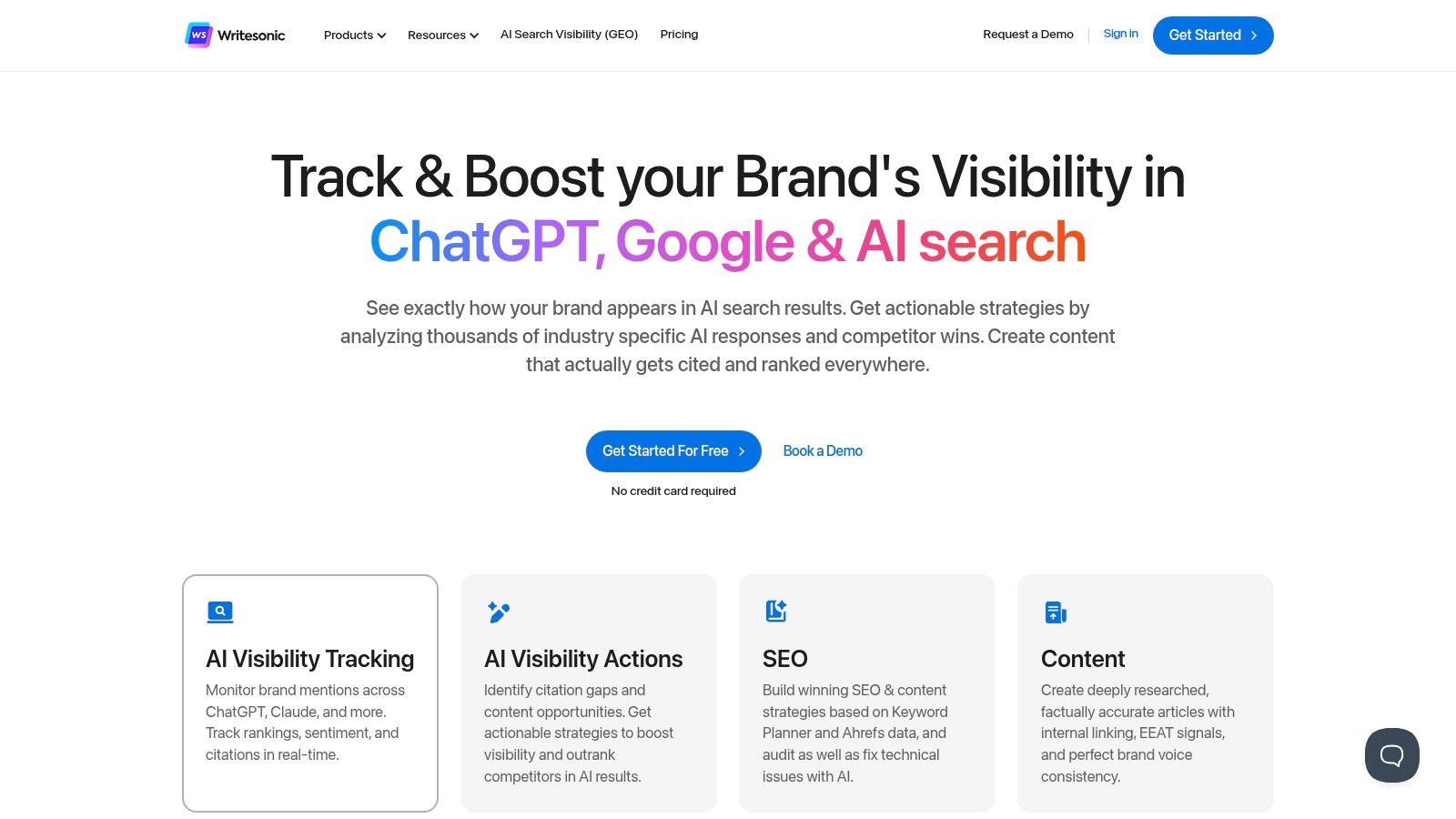
What I appreciate most is its user-friendly interface and the sheer breadth of content types it supports, from long-form articles to Google ad copy. The platform’s AI models are trained on top-performing content, ensuring that the output is not only grammatically correct but also structured for engagement and search engine visibility.
Key Takeaway: Writesonic is an excellent choice for content creators and marketers looking for an affordable, easy-to-use tool to automate content production while maintaining a strong SEO focus.
Core AI Features and Use Cases
- AI Writer (Article Writer 5.0): Ideal for generating complete, well-structured blog posts. I use this to create first drafts, which significantly cuts down my writing time. For example, giving it the prompt “A beginner’s guide to indoor gardening” yields a structured draft with sections on choosing plants, lighting, and watering schedules.
- Content Rewriter (Paraphraser): Perfect for updating and refreshing existing content to improve its SEO value or to repurpose it for different channels without a duplicate content penalty.
- SEO Checker: A handy built-in tool that analyses your generated content for keyword density and other on-page SEO factors, helping to ensure it is ready for publication.
- AI-Driven Content Briefs: This feature helps plan content by providing a structured outline based on competitor analysis, saving valuable research time.
Pricing and Accessibility
Writesonic offers a flexible pricing structure suitable for various needs:
- Free Trial: Provides a limited number of words to test the platform’s core features.
- Small Team: Starting at around £13/month, this plan is great for individuals and small businesses.
- Enterprise: Custom pricing for large organisations needing extensive usage and advanced features.
The platform is very accessible, even for beginners, thanks to its intuitive design. While it is primarily a content generator, its integration of SEO features makes it one of the most practical AI SEO tools for enhancing productivity. You can explore how such tools fit into a broader workflow by looking at various productivity tools.
Website: https://writesonic.com/
9. RankIQ: The Blogger’s AI SEO Toolkit
RankIQ is a highly focused AI SEO tool designed specifically with bloggers and content creators in mind. Where other platforms can be overwhelming, I find RankIQ’s streamlined approach to be its greatest strength. It excels at one primary goal: helping you identify low-competition keywords with high traffic potential and then guiding you to create content that comprehensively covers the topic to rank for those terms.
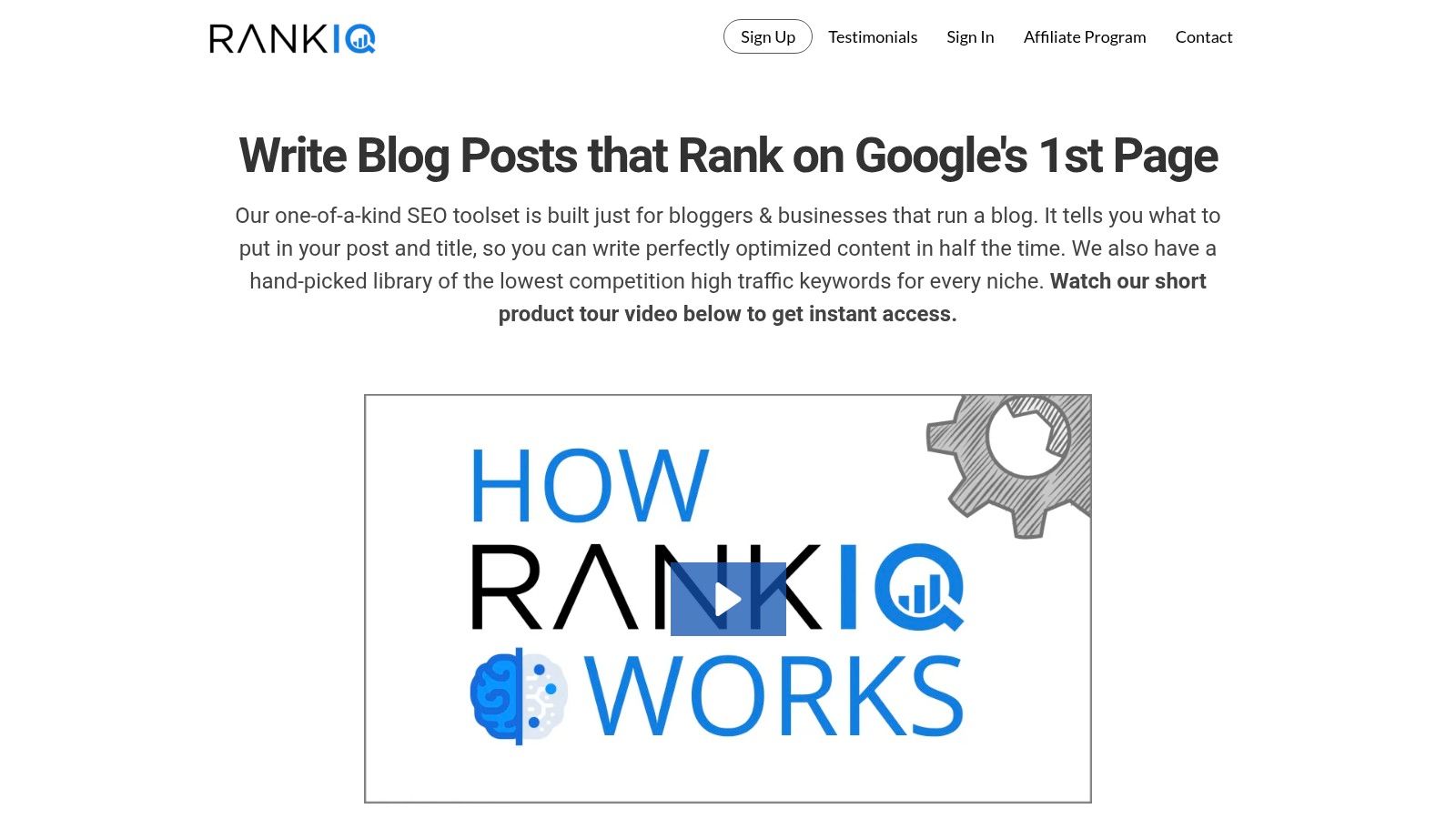
The platform’s AI engine analyses the top-ranking search results for a given keyword and creates a detailed content brief. I use these briefs as a blueprint for my articles, ensuring I cover all the essential sub-topics and questions that Google expects to see. For a niche like “vintage watch collecting,” its library might surface a keyword like “best affordable Swiss watch brands,” which has high search volume but low competition, providing a clear content opportunity. This process removes much of the guesswork from content creation and is incredibly efficient for scaling a blog.
Key Takeaway: For bloggers and niche site builders who need an affordable, easy-to-use tool to find untapped keywords and optimise content effectively, RankIQ is arguably the best-in-class solution.
Core AI Features and Use Cases
- Keyword Library: This is not just a research tool; it is a curated library of low-competition, high-traffic keywords organised by niche, saving countless hours of manual research.
- AI Content Report: After you select a keyword, the AI generates a report that grades your content and provides a checklist of topics and terms to include for a higher ranking.
- Content Optimiser: A real-time editor that grades your draft against its AI-driven recommendations, showing you exactly what is missing to achieve a top score and outrank competitors.
Pricing and Accessibility
RankIQ offers a straightforward and affordable pricing model, which is a welcome change from the complex tiers of larger suites.
- Standard Plan: Starts at around £40/month, providing a set number of AI reports and access to all core features.
The user interface is exceptionally clean and intuitive, making it one of the easiest ai seo tools to master right from the start. It is built for speed and efficiency, perfectly suiting the needs of a solo content creator or a small team without a dedicated SEO specialist. While it lacks the technical audit or backlink analysis features of all-in-one platforms, it delivers exceptional value for its targeted purpose.
Website: https://www.rankiq.com/
10. Exploding Topics: Spotting Trends Before They Peak
Exploding Topics is not a traditional SEO platform; it is a trend-spotting tool powered by AI that gives my content strategy a significant competitive edge. I use it to get ahead of the curve, identifying nascent topics and keywords before they become saturated. Its AI analyses millions of data points from searches, conversations, and media mentions to pinpoint subjects that are on an upward trajectory. This forward-looking insight is invaluable for planning pillar pages and content clusters that will capture traffic as interest grows.
For example, by setting up alerts for “AI in retail,” I can be one of the first to create comprehensive guides or case studies when a new sub-topic begins to surge. This proactive approach is a core part of my strategy for building topical authority. The platform excels by focusing on one thing: delivering reliable, early-stage trend data that directly informs my content calendar.
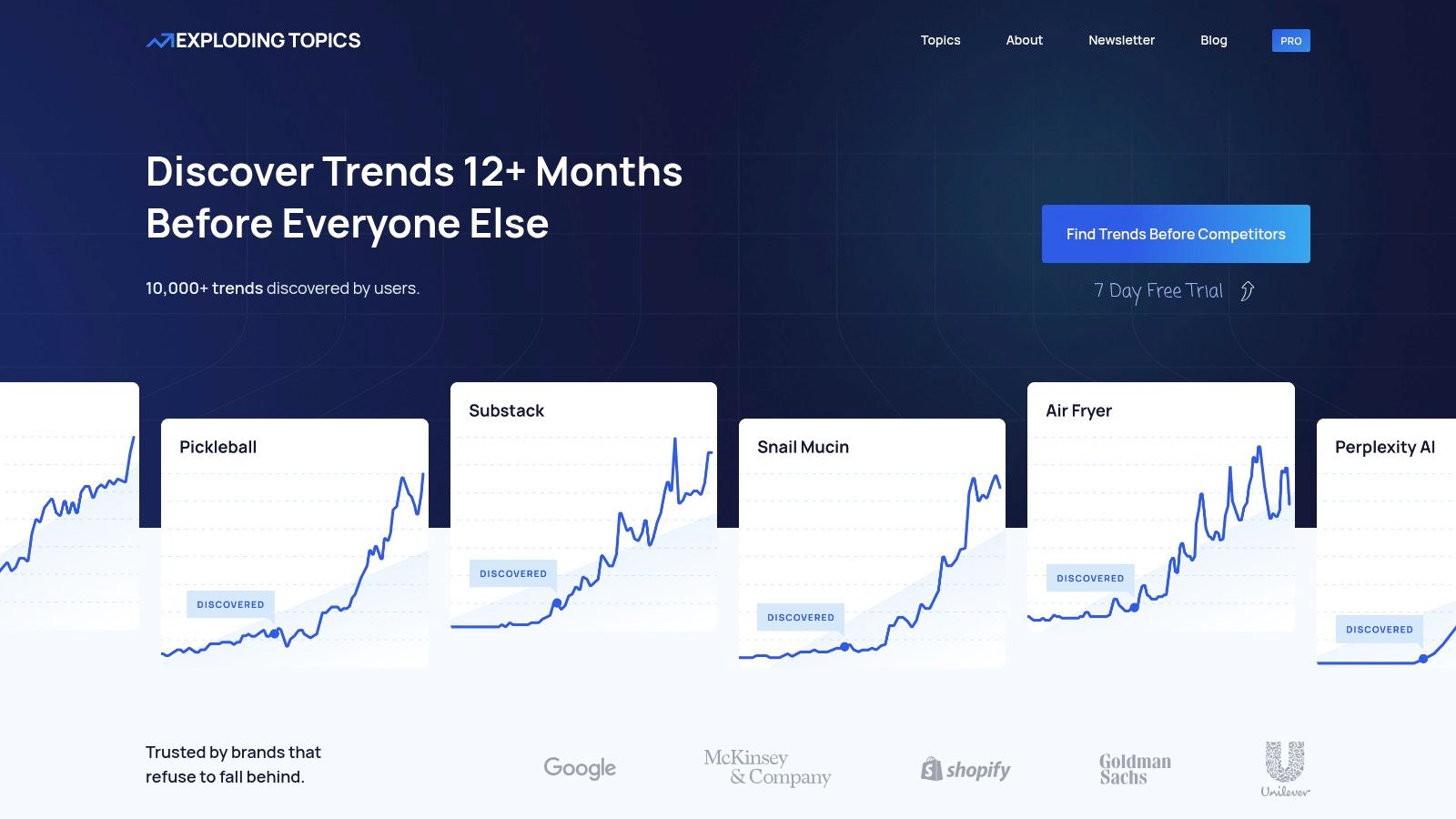
Key Takeaway: Exploding Topics is the perfect complementary tool for any content-focused SEO strategy, enabling you to build relevance by capitalising on trends before your competitors even notice them.
Core AI Features and Use Cases
- Trend Discovery: The core AI engine scans the web to identify trending products, companies, and topics with verifiable growth patterns.
- Topic Tracking & Alerts: I use this to monitor specific keywords or categories relevant to my niche, receiving email alerts when a new trend emerges so I can act quickly.
- Historical Data Analysis: The platform shows trend growth over months or years, which helps me distinguish a fleeting fad from a sustainable trend worth investing SEO effort in.
Pricing and Accessibility
Exploding Topics offers a straightforward pricing structure:
- Entrepreneur: Starts at around £31/month, suitable for solopreneurs and small businesses.
- Investor: Around £78/month, offering more tracked topics and project capabilities.
- Business: Approximately £197/month, designed for larger teams and agencies needing extensive trend data.
There is a limited free version that lets you explore recent trends, but the paid plans unlock the essential features like tracking, alerts, and access to the full trends database. While it is not a comprehensive suite of AI SEO tools, its specialised function makes it a powerful and accessible addition to any digital marketing toolkit, especially given its clean and intuitive user interface.
Website: https://explodingtopics.com/
AI SEO Tools Feature Comparison
| Tool Name | Core Features | User Experience | Value Proposition | Target Audience | Price Point |
|---|---|---|---|---|---|
| Tool Types – SEO | SEO tool categorization overview | Clear categorization | Strategic clarity for selecting tools | SEO professionals, marketers | Free |
| Semrush | AI keyword research, content tools | User-friendly, updated | All-in-one marketing platform | Beginners to experts | High |
| Ahrefs | Backlink analysis, keyword explorer | Intuitive, accurate data | Robust data for SEO strategies | SEO experts, businesses | High |
| SurferSEO | Content editor, SERP analyzer | Intuitive interface | AI-driven on-page content optimization | Content marketers | Medium to high |
| Frase | AI content briefs, writing assistant | User-friendly | Streamlines content creation | Writers, marketers | Affordable |
| WriterZen | Keyword clustering, plagiarism check | Easy to use | Affordable, comprehensive SEO toolkit | Small to mid businesses | Affordable |
| MarketMuse | Content briefs, topic modeling | User-friendly | In-depth content planning and insights | Content strategists | High |
| Alli AI | Bulk SEO changes, real-time edits | User-friendly | Efficient large-scale SEO operations | Enterprises, SEO teams | High |
| Writesonic | AI writer, SEO checker | User-friendly | Automated, multi-content type creation | Content creators, marketers | Affordable |
| RankIQ | Content optimization, keyword research | Simple interface | Tailored for bloggers and small businesses | Bloggers, small businesses | Affordable |
| Exploding Topics | Trend discovery, topic tracking | Easy to use | Early trend identification for SEO | Marketers, content planners | Medium |
Choosing the Right AI SEO Tool for Your Strategy
As we have journeyed through this detailed breakdown of the leading AI SEO tools, one thing has become abundantly clear: the future of search engine optimisation is not about replacing human expertise, but augmenting it. The landscape, populated by powerhouses like Semrush and Ahrefs, content-focused specialists like SurferSEO and Frase, and innovative newcomers like Alli AI, offers a solution for nearly every conceivable SEO challenge. There is no single “best” platform that reigns supreme for every user. The most effective tool is the one that seamlessly integrates into your existing workflow and directly addresses your most significant bottlenecks.
The sheer variety can feel overwhelming, but this diversity is your greatest advantage. You have the power to select a toolset precisely tailored to your strategic goals, team size, and budget. From my experience, the initial step is always a candid assessment of your current SEO process. Where do you spend the most time? What tasks yield the lowest return on investment? Identifying these pain points is crucial.
A Framework for Your Decision
Making the right choice requires moving beyond feature lists and focusing on strategic alignment. I recommend filtering your options based on your primary role and business model.
- For Content Creators & Bloggers: If your primary focus is creating high-ranking blog content at scale, specialised tools like RankIQ or WriterZen are designed for your exact workflow. They excel at identifying low-competition keywords and providing structured, AI-driven outlines that streamline the entire writing and optimisation process.
- For All-in-One SEO Agencies & In-House Teams: If you need a comprehensive suite that covers everything from keyword research and competitor analysis to technical audits and rank tracking, industry titans like Semrush and Ahrefs remain unparalleled. Their AI-infused features, such as Semrush’s ContentShake AI or Ahrefs’ keyword suggestions, are now core components of their powerful platforms.
- For Large Enterprises & E-commerce Sites: For businesses managing vast websites with complex content strategies, the strategic depth offered by a platform like MarketMuse is invaluable. It moves beyond single-page optimisation to analyse and recommend improvements for your entire topical authority. Similarly, Alli AI offers a unique proposition by focusing on the implementation of technical SEO fixes, a game-changer for teams without extensive development resources.
- For Trend-Spotters & Niche Marketers: Sometimes, the goal is not just to rank for existing terms but to discover the next big thing. This is where a tool like Exploding Topics shines, using AI to surface trending topics before they become saturated, giving you a crucial first-mover advantage.
Implementation and the Human Element
Remember, adopting any of these powerful AI SEO tools is not a “set it and forget it” solution. Success hinges on strategic implementation. My advice is to start small. I do not undertake a revolution of my entire SEO strategy overnight. Pick one key area for improvement, such as on-page content optimisation, and master the relevant tool’s features before expanding.
Most importantly, never cede your critical thinking to the algorithm. Use the AI’s suggestions as a data-informed starting point, not an infallible command. AI can analyse SERPs and identify patterns with incredible speed, but it lacks the human nuance to understand brand voice, audience sentiment, and overarching business goals. The most potent combination will always be your strategic insight powered by the analytical force of artificial intelligence.
By thoughtfully selecting and integrating the right AI SEO tools, you are not just automating tasks; you are equipping yourself with a formidable competitive advantage. You are freeing up valuable time to focus on high-level strategy, creative thinking, and building genuine connections with your audience, ultimately driving sustainable and meaningful growth in the search rankings.
Navigating the complexities of AI and implementing a cohesive SEO strategy can be a significant challenge. If you are looking for expert guidance to select the right tools and build a data-driven plan tailored to your business, Mersudin Forbes Digital specialises in precisely that. Visit Mersudin Forbes Digital to learn how my personalised SEO consulting can help you leverage AI to achieve your growth targets.


